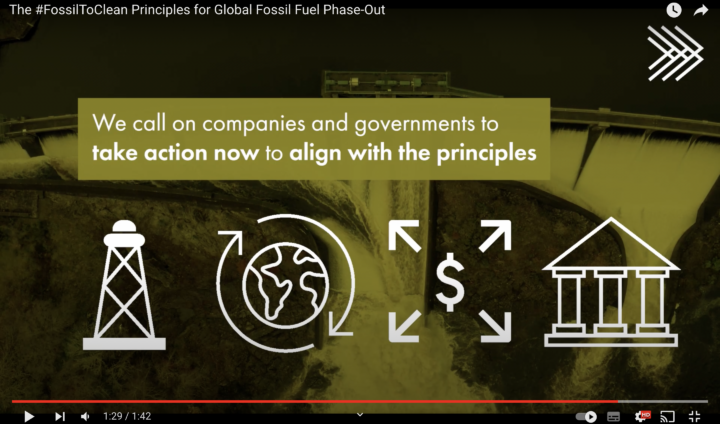

Principles for global fossil fuel phase-out
To stay below 1.5°C of warming and ensure a livable future, emissions must peak by 2025 and halve by 2030. To achieve this, all actors must row-in together for a well-managed and just transition from fossil fuels to clean energy.
We Mean Business Coalition has developed a set of principles, with advice from leading experts including SBTi and ETC, that establish a North-Star for fossil fuel phase-out across oil and gas producers, corporate energy consumers, government and finance. The principles outline the clear and credible action needed from these key actors to decarbonize the global energy system by the 2040s at the very latest.
Commit to phase out across operations the use of unabated thermal coal and unabated oil and gas by 2040 at the latest
Set a credible net-zero commitment and publish a Climate Transition Action Plan (CTAP) showing:
a. Phase-out plan that includes interim reduction targets for fossil fuel use
b. Phase-in plan and targets for scaling clean energy that supports the phase-out of unabated fossil fuels by 2040
Commit to getting a majority of Tier 1 suppliers to set credible net-zero commitments well before 2030
Commit to no new oil and gas exploration or development of new oil and gas fields
Reach near-zero methane emissions by 2030 at the latest
Publish a Climate Transition Action Plan (CTAP) showing:
a. % decline of existing production volume by 2030 and 2040, reaching zero by 2050 (2021 baseline)
b. % decline of oil and gas products for energy use by 2030 and 2040 (2021 baseline)
c. % decline of unabated operational emissions by 2030 and 2040 (2021 baseline)
d. % of CAPEX dedicated to clean solutions every five years
Set a science-based target (once the SBTi standard is available)
Immediately end new financial flows to coal value chain and all new oil and gas exploration or development of new oil and gas fields.
Publish a Climate Transition Action Plan (CTAP).
Adopt timebound restrictions for the phase out of all existing financial flows:
a. 2030 at the latest for oil companies not aligned with 1.5°C and unabated oil projects
b. 2040 at the latest for gas companies not aligned with 1.5°C and unabated gas projects
c. 2030 at the latest for coal projects and companies in high and high-middle income countries; and 2040 at the latest for all other countries
Increase the ratio of financial flows in clean energy solutions (vs. fossil) every year at the portfolio level.
Set a science-based target (once the SBTi FI Net Zero standard is available in 2024)
Set targets and timelines for the phase out of unabated fossil fuels in line with 1.5 °C supported by national plans and policies to ensure a just transition for affected workers and communities. Wealthier countries, as historic emitters, have the responsibility to be first movers.
Commit to reaching 100% decarbonized power systems by 2035 in advanced economies and by 2040 for other countries, at the latest.
Support countries in the Global South in diversifying their economies and developing net-zero pathways, including through the provision of finance and capacity-building for just transition planning.
Act to reorient public and private financial flows away from fossil fuels, including by setting a meaningful price on carbon and reforming and repurposing fossil fuel subsidies.

Stay in touch
Sign up for updates on the campaign and ways to take action.
"*" indicates required fields



